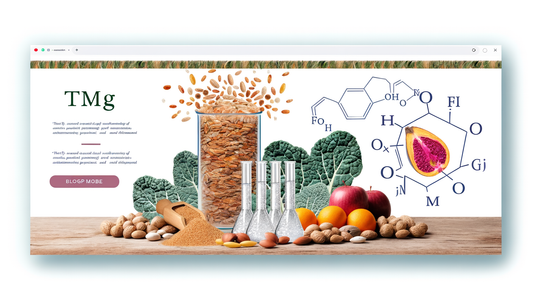Imagine a tiny molecule, quietly working behind the scenes to keep your cells functioning at their best. This unassuming compound, known as betaine, plays a crucial role in one of the body's most fundamental processes: methylation. Yet, despite its importance, betaine often flies under the radar in discussions about health and nutrition. Let's dive into the world of this unsung hero and discover why it deserves more attention in our quest for optimal wellness.
What is Betaine?
Betaine, also known as trimethylglycine (TMG), is a naturally occurring compound found in various foods and produced by the body. You can find betaine in beets (hence its name), spinach, quinoa, wheat bran, and certain meats. Our bodies also synthesize betaine from choline and the amino acid glycine.
This versatile molecule serves multiple functions in the body, but its starring role is in the methylation process. Betaine acts as a methyl donor, providing the essential building blocks for numerous biochemical reactions that keep our cells running smoothly.

The Methylation Process: A Key to Cellular Health
Methylation is a vital cellular process that involves the transfer of methyl groups (CH3) to various molecules throughout the body. This seemingly simple action has far-reaching consequences for our health, influencing everything from DNA repair to neurotransmitter production.
Betaine's role as a methyl donor makes it an indispensable player in this process. By providing methyl groups, betaine supports the production of crucial compounds like:
- Vitamins
- Amino acids
- Neurotransmitters
- Hormones
- Nucleic acids

Without proper methylation, our bodies would struggle to maintain optimal function across multiple systems.
Betaine's Impact on Homocysteine Metabolism
One of betaine's most significant contributions to health is its ability to help manage homocysteine levels. Homocysteine is an amino acid that, when present in high amounts, can be detrimental to cardiovascular health.
Betaine helps convert homocysteine back into methionine, a process facilitated by the enzyme betaine homocysteine methyl transferase (BHMT). This recycling mechanism is crucial for maintaining healthy homocysteine levels and supporting overall cardiovascular well-being.
For individuals with homocystinuria, a rare genetic disorder characterized by elevated homocysteine levels, betaine supplementation can be particularly beneficial. Studies have shown that betaine effectively reduces plasma homocysteine levels by 20-30% in these patients, improving metabolic abnormalities and potentially mitigating associated health risks.
Cellular Health Benefits of Betaine
Beyond its role in methylation and homocysteine metabolism, betaine offers several other benefits for cellular health:
-
Osmoprotection: Betaine acts as an osmolyte, helping cells maintain optimal water content. This function is crucial for cell stability and function, especially under stress conditions.
-
Protein Stabilization: By interacting with proteins, betaine helps maintain their proper structure and function, even in challenging environments.
-
Energy Metabolism: Betaine supports the production of creatine, an important compound for energy metabolism, particularly in muscle cells.
-
Neurotransmitter Synthesis: As a methyl donor, betaine indirectly supports the production of neurotransmitters, potentially influencing mood and cognitive function.
Betaine and Liver Function
The liver, our body's primary detoxification organ, also benefits from betaine's supportive properties. Research suggests that betaine may help protect liver cells from damage caused by factors like alcohol consumption or fatty liver disease.
By promoting methylation in the liver, betaine supports the production of S-adenosylmethionine (SAMe), a compound crucial for liver health and function. This relationship highlights betaine's potential role in supporting overall liver health and detoxification processes.
Betaine Supplementation: Uses and Considerations
While betaine is available through dietary sources, some individuals may benefit from supplementation. Common reasons for considering betaine supplements include:
- Genetic variations, such as MTHFR mutations, that may affect methylation efficiency
- Support for cardiovascular health
- Liver support
- Athletic performance enhancement
- Management of homocystinuria
Betaine supplements are typically available in powder or capsule form, with dosages ranging from 500mg to 3000mg per day, depending on individual needs and health goals. As with any supplement, it's crucial to consult with a healthcare provider before starting a betaine regimen.
It's important to note that betaine may increase methionine levels in some individuals, particularly those with cystathionine beta-synthase (CBS) deficiency. Regular monitoring of plasma homocysteine and methionine levels is recommended for individuals supplementing with betaine, especially those with known metabolic disorders.
Research and Clinical Applications

The potential benefits of betaine continue to be a subject of ongoing research. Current studies are exploring its effects on:
- Mood and emotional balance
- Energy levels and athletic performance
- Cognitive function
- Metabolic health
While more research is needed to fully understand betaine's impact on these areas, early results are promising. For example, some studies suggest that betaine may enhance the mood-boosting effects of other supplements like SAMe, offering potential new avenues for supporting mental health.
In clinical settings, betaine is already used to treat homocystinuria, demonstrating its efficacy in managing this rare genetic disorder. As research progresses, we may see expanded applications for betaine in treating other metabolic conditions or supporting overall health.
Conclusion
Betaine may not be a household name, but its role in methylation and cellular health is undeniably crucial. From supporting cardiovascular health to aiding in liver function and potentially influencing mood and cognition, betaine's contributions to our well-being are diverse and significant.
As we continue to unravel the complexities of cellular health, betaine stands out as a key player worthy of more attention.
Whether obtained through a balanced diet rich in betaine-containing foods or through targeted supplementation, this unsung hero of methylation deserves a place in our conversations about health and nutrition.
By recognizing the importance of betaine and supporting our body's methylation processes, we take a significant step towards optimizing our cellular health and overall well-being.
As research progresses, we may discover even more reasons to celebrate this remarkable compound and its role in keeping our cells – and by extension, our bodies – functioning at their best.






